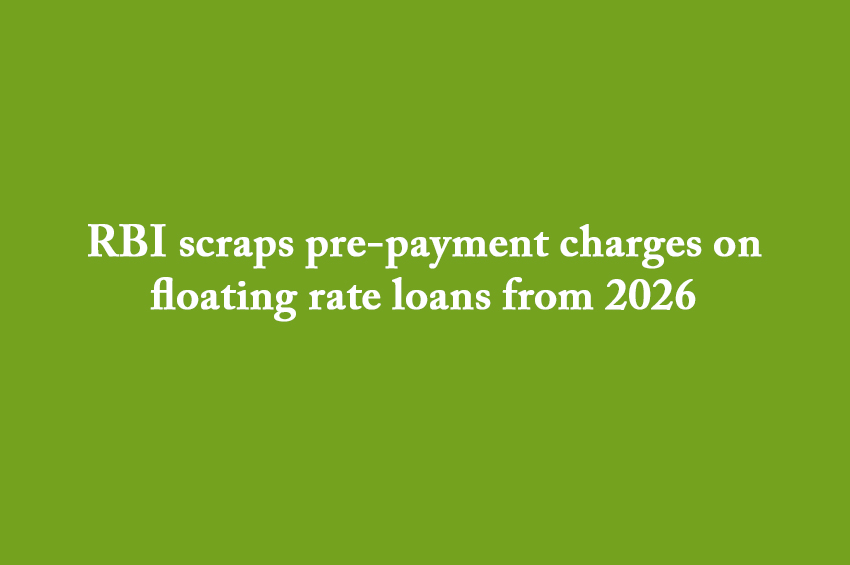Winning Bizness Desk
Major relief for home loan, MSE borrowers; uniform rules for banks, NBFCs
In a major relief to loan borrowers, the Reserve Bank of India has announced that banks and regulated financial institutions can no longer impose pre-payment charges on floating interest rate loans from January 1, 2026. This move is aimed at ensuring transparency and eliminating ambiguity in loan-related policies. Currently, borrowers are penalized for repaying part or full loan amounts before the term ends. The new rule will apply to both banks and non-banking finance companies (NBFCs), ensuring a level playing field across institutions.
Who stands to benefit
The regulation will primarily benefit individuals and micro and small enterprises (MSEs) who have taken loans on floating rates for non-commercial or business purposes. Whether the loan is taken individually or jointly, banks and NBFCs will no longer be allowed to charge pre-payment penalties. The provision applies even if the borrower decides to switch to a different lender offering lower interest rates, thus promoting healthy competition and consumer-friendly banking.
Exceptions and conditional relief
The exemption will not extend to certain categories of institutions such as Small Finance Banks, Regional Rural Banks, Local Area Banks, Tier-4 Urban Co-operative Banks, Upper Layer NBFCs (NBFC-UL), and All India Financial Institutions. However, loans up to Rs 50 lakh from some of these excluded institutions—including Tier-3 Urban Co-operative Banks, State and Central Co-operative Banks, and Middle Layer NBFCs (NBFC-ML)—will still be exempt from pre-payment charges.
Why RBI introduced the change
The RBI said its review found inconsistent pre-payment policies among regulated entities, leading to confusion and customer grievances. Additionally, some institutions were inserting restrictive clauses in loan agreements to discourage borrowers from switching to cheaper loans. The new framework eliminates such practices and clarifies that the waiver on charges will apply regardless of the source of repayment funds, the size of the payment, or whether it is part or full repayment. No lock-in period can be enforced for such loans.
Clarity on fixed-term loans and disclosures
For fixed-term loans, RBI has allowed pre-payment charges, but only on the prepaid amount. In overdraft and cash credit cases, if borrowers notify lenders in advance and close the loan on schedule, no charges will be applied. RBI has also mandated full disclosure of all such charges in the loan acceptance letter, agreement, and Key Fact Statement (KFS). If not mentioned in the KFS, institutions cannot recover such charges later. This step is seen as a move to enhance transparency and protect borrowers’ rights.
Know this development through Q&A-
Q1. What has the RBI announced?
RBI has scrapped pre-payment charges on floating rate loans for banks and NBFCs, effective from January 1, 2026.
Q2. Who will benefit from this rule?
Individual borrowers and MSEs who have taken non-commercial or business loans on floating rates will benefit the most.
Q3. What types of loans are covered?
All floating interest rate loans—whether fully or partially prepaid—will be covered. This includes home loans and business loans.
Q4. Are there any exceptions?
Yes. Institutions like Small Finance Banks, Regional Rural Banks, and NBFC-ULs are excluded. However, loans up to Rs 50 lakh from some such institutions are exempted.
Q5. What led to this change?
RBI found irregular and restrictive pre-payment policies, causing confusion and restricting borrowers from opting for better loan options.
Q6. What if the loan is repaid from any source?
Pre-payment charge exemption applies irrespective of the repayment source or amount.
Q7. What else is required from lenders?
All pre-payment rules must be clearly mentioned in the loan contract, letter, and Key Fact Statement. If not mentioned, charges can’t be levied later.


